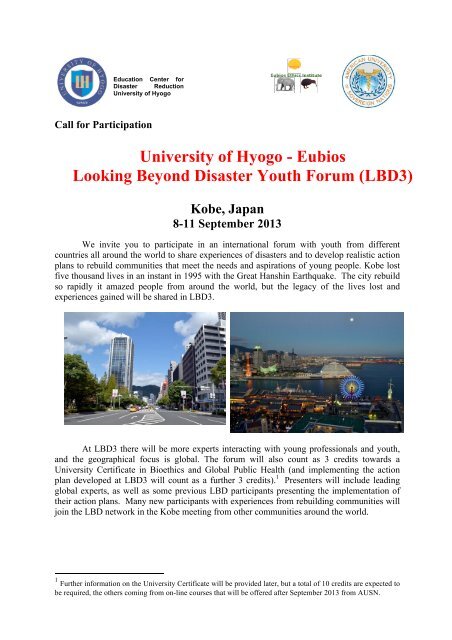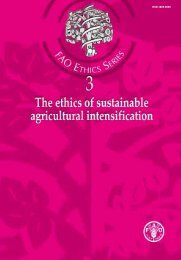University of Hyogo - Eubios Ethics Institute
University of Hyogo - Eubios Ethics Institute
University of Hyogo - Eubios Ethics Institute
Create successful ePaper yourself
Turn your PDF publications into a flip-book with our unique Google optimized e-Paper software.
Education Center for<br />
Disaster Reduction<br />
<strong>University</strong> <strong>of</strong> <strong>Hyogo</strong><br />
Call for Participation<br />
<strong>University</strong> <strong>of</strong> <strong>Hyogo</strong> - <strong>Eubios</strong><br />
Looking Beyond Disaster Youth Forum (LBD3)<br />
Kobe, Japan<br />
8-11 September 2013<br />
We invite you to participate in an international forum with youth from different<br />
countries all around the world to share experiences <strong>of</strong> disasters and to develop realistic action<br />
plans to rebuild communities that meet the needs and aspirations <strong>of</strong> young people. Kobe lost<br />
five thousand lives in an instant in 1995 with the Great Hanshin Earthquake. The city rebuild<br />
so rapidly it amazed people from around the world, but the legacy <strong>of</strong> the lives lost and<br />
experiences gained will be shared in LBD3.<br />
At LBD3 there will be more experts interacting with young pr<strong>of</strong>essionals and youth,<br />
and the geographical focus is global. The forum will also count as 3 credits towards a<br />
<strong>University</strong> Certificate in Bioethics and Global Public Health (and implementing the action<br />
plan developed at LBD3 will count as a further 3 credits). 1 Presenters will include leading<br />
global experts, as well as some previous LBD participants presenting the implementation <strong>of</strong><br />
their action plans. Many new participants with experiences from rebuilding communities will<br />
join the LBD network in the Kobe meeting from other communities around the world.<br />
1 Further information on the <strong>University</strong> Certificate will be provided later, but a total <strong>of</strong> 10 credits are expected to<br />
be required, the others coming from on-line courses that will be <strong>of</strong>fered after September 2013 from AUSN.
The expected outcomes <strong>of</strong> LBD3 include:<br />
• Saving lives and reducing the suffering from disasters;<br />
• Greater multidisciplinary cooperation in disaster management;<br />
• Giving hope in concrete ways for recovery <strong>of</strong> communities from disasters;<br />
• Support for youth-led projects to be implemented in different countries;<br />
• Development <strong>of</strong> evaluation and fund raising skills;<br />
• Learning lessons from the rapid recovery in Kobe after 1995;<br />
• Examining the psychosocial issues and challenges <strong>of</strong> community rebuilding;<br />
• Getting social and the policy structures ready for rapid response to disasters;<br />
• Following up on recommendations on information flow in disasters; youth resilience,<br />
rebuilding communities and disaster response expressed in the Christchurch and<br />
Sendai Communiques <strong>of</strong> LBD1 and LBD2;<br />
• Considerations <strong>of</strong> academic and community infrastructures that can assist youth;<br />
• Strengthening the global network <strong>of</strong> young people across the world empowered to<br />
share experiences and exchange ideas on disaster and community;<br />
Who can come?<br />
The conference will bring together experts from different fields <strong>of</strong> disaster<br />
management and young pr<strong>of</strong>essionals who are working to rebuild communities from disasters.<br />
We seek participants who are highly motivated to dialogue with others from around the world,<br />
and from different disciplines, to review their past actions, and design together new action<br />
plans to assist in all aspects <strong>of</strong> disaster mitigation and recovery.<br />
Some <strong>of</strong> the participants will have experienced natural disasters, and the challenges<br />
that means for their communities. Some have developed structures to enhance youth<br />
community service, and youth involvement in recovering from communities. If you have any<br />
inquiries you can write to the organizers.<br />
(sankei.jp.msn.com)<br />
Organisers<br />
The organisers are the Education Center for Disaster Reduction at the <strong>University</strong> <strong>of</strong><br />
<strong>Hyogo</strong>, <strong>Eubios</strong> <strong>Ethics</strong> <strong>Institute</strong>, and American <strong>University</strong> <strong>of</strong> Sovereign Nations (AUSN).<br />
General<br />
The conference will be informal, and meals, lunches and tea breaks will be provided in<br />
the conference package. English is the working language, but interpretation between English<br />
and Japanese will be available. It is possible to develop action plans in other languages, but an<br />
English translation should be provided. It is intended to make the conference a memorable<br />
time together in sharing lessons and friendships, in various ways across cultures.
How to apply?<br />
There is no application fee. Applications to participate should complete the<br />
registration form, which includes a letter composed by you that outlines (in less than 500<br />
words) why you would like to participate in this forum, post-disaster activities you have been<br />
involved in, your degrees and pr<strong>of</strong>essional experience.<br />
Send your registration form and all emails to Dr. Michiko Banba and Dr. Darryl Macer<br />
through the Email <strong>of</strong> the secretariat: lookingbd@gmail.com<br />
Registration fee<br />
Registrants should cover their own expenses to travel to Kobe, and pay the meal and<br />
accommodation package at JPY20,000 for university students, and JPY25,000 for others for<br />
the meals and accommodation from 8 th September checkin to 11 th checkout. This price<br />
includes a group excursion on the 8 th to several sites related to the Great Hanshin Earthquake.<br />
If you need accommodation on 7 th , please consult with us individually.<br />
You may wish to take the opportunity to travel in Japan to experience the beauty <strong>of</strong> the<br />
country and hospitality <strong>of</strong> its people before or after the Forum.<br />
The ongoing programme fosters information exchange between members who have<br />
faced many different types <strong>of</strong> disaster (not directly human-made, although many have<br />
significant contributory factors from human activity and environmental change). The training<br />
forum focuses on the development <strong>of</strong> practical action plans, and the evaluation <strong>of</strong> ongoing<br />
plans, which meet the needs <strong>of</strong> people in different communities affected by disasters. These<br />
forums will empower youth with a variety <strong>of</strong> skills and talents, and a heart to help others, with<br />
further tools they need to activate and accelerate change in their vulnerable communities<br />
through the (further) development <strong>of</strong> action plans with a focus on their successful<br />
implementation and sustainability. By making clear, concise and actionable plans, young<br />
people will learn how to engage their peers and communities and monitor the progress <strong>of</strong> their<br />
initiatives, while being mentored by leading experts around the world. Disasters happen at<br />
any time and we need support for many <strong>of</strong> these plans for our communities to rebuild.<br />
Further background<br />
While hazards are natural, disasters are not. Young people need to not only be aware<br />
<strong>of</strong> the risks and impacts <strong>of</strong> hazards, but also have take action to prepare for and respond to<br />
disasters. Young people have shown already their potential to create a world that takes a<br />
proactive stance against tragedies caused by disaster. Disasters can destroy communities but<br />
also rebuild them. As key agents <strong>of</strong> promoting change we have gathered young community<br />
leaders in the Youth Looking Beyond Disaster programme.
The First UNESCO Youth Forum: Looking Beyond Disaster was held in December<br />
2011 in Christchurch, New Zealand, with 100 participants from around the world, under the<br />
auspices <strong>of</strong> UNESCO, with funding principally from the New Zealand National Commission<br />
to UNESCO, and UNESCO Bangkok and UNESCO Apia, and other sponsors. Youth<br />
developed 25 action plans to rebuild communities from disasters. 2<br />
The Second UNESCO Youth Forum: Looking Beyond Disaster was held in August<br />
2012 in Sendai, Japan, with a similar number, with funding from <strong>Eubios</strong> <strong>Ethics</strong> <strong>Institute</strong> and<br />
the Education Center for Disaster Reduction <strong>University</strong> <strong>of</strong> <strong>Hyogo</strong>, under the auspices <strong>of</strong><br />
UNESCO. Participants developed a further 25 action plans to rebuild communities from<br />
disasters.<br />
The Third International Youth Forum Looking Beyond Disaster (LBD3) will continue<br />
with the team who organised LBD2, led by Pr<strong>of</strong>essors Darryl Macer and Michiko Banba, with<br />
funding from the Education Center for Disaster Reduction <strong>University</strong> <strong>of</strong> <strong>Hyogo</strong> and <strong>Eubios</strong><br />
<strong>Ethics</strong> <strong>Institute</strong>, in cooperation with the American <strong>University</strong> <strong>of</strong> Sovereign Nations. 3<br />
Kobe has been a meeting point <strong>of</strong> cultures for centuries, with many European houses,<br />
and a China town, and forest and mountains in the city limits. It is less than one hour away<br />
from the ancient capital <strong>of</strong> Japan Kyoto, even closer to Osaka, and 90 minutes train to<br />
Hiroshima. Kobe is served by several major airports, including KIX (Kansai International<br />
Airport, the first 24 hour operating airport in Japan built on an artificial island)… There is a<br />
hydr<strong>of</strong>oil directly from KIX to Kobe…<br />
2 The current LBD action plans, pr<strong>of</strong>iles <strong>of</strong> participants and some reports <strong>of</strong> the results, along with general<br />
objectives <strong>of</strong> the LBD forum and recommendations are available on the <strong>Eubios</strong> <strong>Ethics</strong> <strong>Institute</strong> website<br />
http://www.eubios.info/youth_looking_beyond_disaster<br />
3 LBD3 is not associated with UNESCO. UNESCO Bangkok was expected to hold a LBD forum in Padang in<br />
June 2013, but has announced postponement to hold a UNESCO LBD in October 2013 in Indonesia, which is<br />
awaiting confirmation.

















